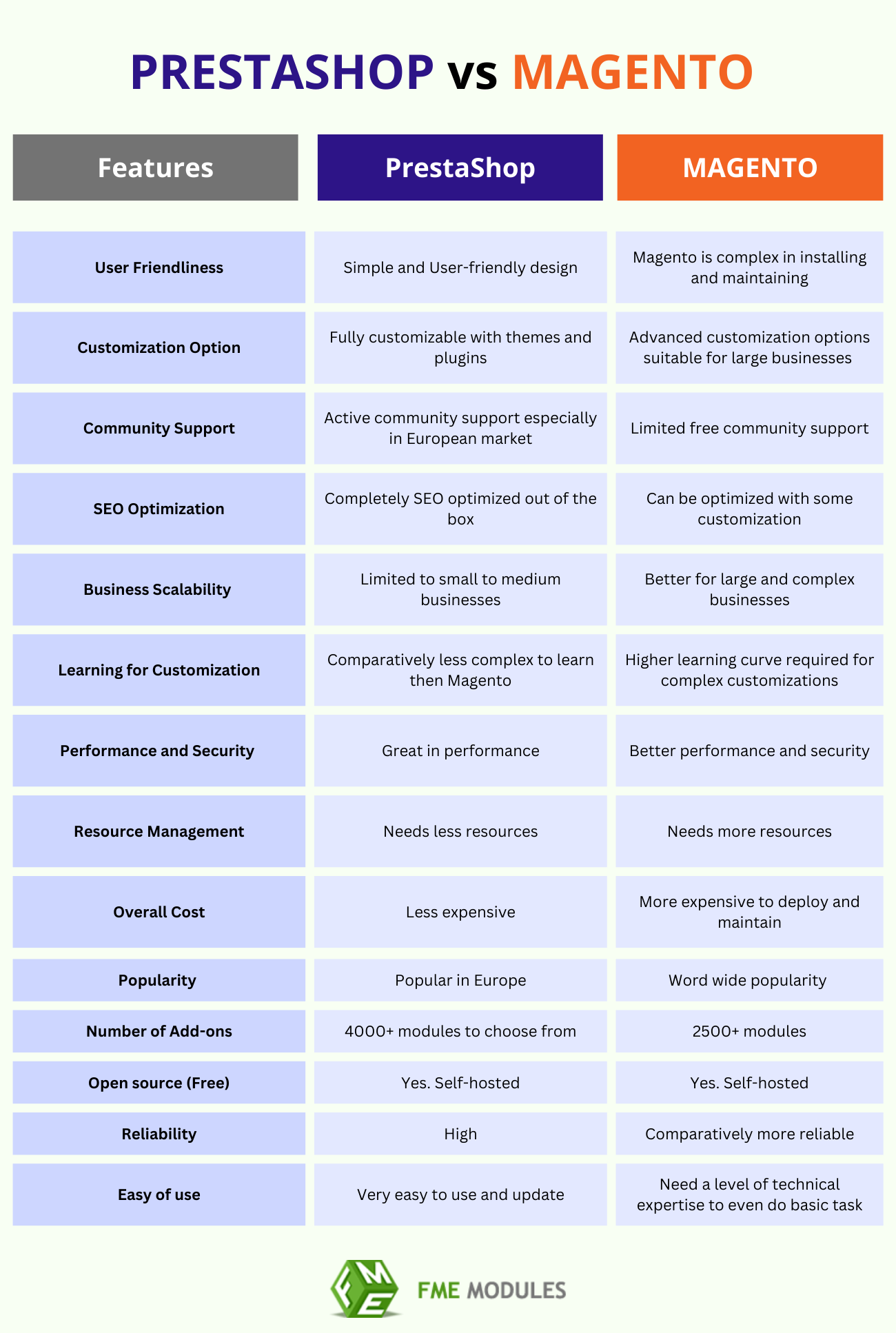PrestaShop Vs. Magento: Choosing the right platform 2024

Posted On: Jun 2, 2023
Categories: Shopping Carts & Platforms
Several factors must be considered before choosing a platform. This blog will help you decide between PrestaShop and Magento as the best eCommerce platform.
Magento allows you to create attractive online shops with advanced functionality and provides powerful tools to help you build an online e-commerce business.
Prestashop is a customizable eCommerce platform perfect for international distribution. It is also intuitive to use. Prestashop is the best option if you want to launch your online store. Magento, but offers more features.
In today’s discussion, we will discuss in detail both Prestashop & Magento to explore their strengths, limitations, and everything in between.
PrestaShop VS Magento: Comparison of Two E-commerce Platforms 2024
There are different features of the two platforms, Magento and Prestashop. Magento can grow with your business. PrestaShop suits medium-sized companies, while Magento is best suited to enterprise-level enterprises. PrestaShop's limited functionality is a downside to its ease of use.
That’s why we have brought you the showdown of PrestaShop vs. Magento, which has many features and benefits to enhance your e-commerce experience.
Setting the stage for the PrestaShop vs. Magento
There is no doubt that competition reigns supreme in the dynamic world of e-commerce. It makes selecting and researching even more important and overwhelming for new businesses. It’s because of the hundreds of options available in the online marketplace.
It’s an extremely important decision because it lays the foundation to a new level or can hold back your success. That’s why we have researched two big platforms, Prestashop and Magento, that have a reputation for their distinctive reputation and unique offerings. Just imagine a platform that blends user-friendliness with extensive customization & allows your store to match your brand image. Not only that, but it also attracts your customers and facilitates your customers with a smooth transaction.

Overview of PrestaShop
Prestashop is an open-source & feature-rich e-commerce platform that empowers thousands of e-commerce businesses worldwide. It has a vibrant and engaging community of developers continuously upgrading its modules and themes yearly. At its core, Prestashop is built on open-source tech that enables unparalleled flexibility & customization to improve your appearance and functionality.
The best thing about Prestashop is that it provides endless possibilities. It will help you match your store with your brand’s identity & captivate the overall shopping experience for your customers. The backend is intuitive and user-friendly, so you can manage your store with less technical expertise.
Features and functionalities of PrestaShop
Prestashop offers various features that benefit store owners in many ways. It empowers store owners with its extensive library of themes & its robust SEO module capabilities. A comprehensive dashboard will help you manage products, track inventory, process orders, and analyze sales performance. Moreover, it offers seamless payment integration to help you provide a smooth and hassle-free transaction for your customers.
Prestashop is a versatile platform that supports businesses of all sizes. Its modular architecture allows easy expansion and integration with third-party tools. It will also empower your decision with its detailed analytical and reporting features that give detailed insights about your business.
In the PrestaShop vs. Magento battle, PrestaShop shines as an open-source champion, delivering flexibility, usability, and various features to propel your eCommerce venture forward.
- User-friendly interface and easy setup process
Prestashop is simple in design and user-friendly, which makes it a leader in the Prestashop vs. Magento battle. It has an intuitive interface and a straightforward process, and it can save time and effort even for a non-technical person to grow their business.
- Extensive range of customization options
Prestashop has various customization features. You can customize your shop and match it with your brand identity. Whether you are a seasoned entrepreneur or a new businessperson, Prestashop will provide you with an array of themes, templates, and modules to create a fully customizable and stunning website. You can attract new customers and engage your existing customers to keep coming back for more.
- Robust community support and an active marketplace
Prestashop has an active and vibrant community of developers, sellers, and enthusiasts that keep it updated and ensure you are supported in the e-commerce journey. They will help you with anything related to e-commerce, such as troubleshooting assistance, innovative solutions, or just seeking advice.
Moreover, various plugins and extensions are available that will enhance your website's functionality and meet your business's unique needs.
- SEO-friendly features and optimized performance
Prestashop is the best platform in terms of SEO features and optimized performance. It will help you equip with customizable URLs to Meta tags that will enhance your ranking in organic searches. Furthermore, Prestashop is excellent in speed and performance, ensuring speedy loading times and a seamless browsing experience.
- Limited scalability for larger eCommerce businesses
There is no doubt about Prestashop’s various advantages. However, this platform also has some limitations. One is its scalability for larger businesses. If you are growing your e-commerce business on a larger scale, you may experience challenges, such as handling a large volume of traffic and transactions.
Prestashop is suitable for smaller businesses. However, a large-scale business isn’t a good option.
- The higher learning curve for complex customization
You must have more knowledge for higher and more complex customization. Prestashop is open source and offers many customization options, but it will require more knowledge about programming languages and web development.
It can be challenging for a non-technical person to handle more advanced customization.
- Relatively fewer built-in features compared to Magento
Prestashop has the least number of built-in features. However, it provides essential functionalities to help you run your store smoothly. If you are looking for more built-in options in the platform, Prestashop doesn’t have more.
In short, PrestaShop offers a range of benefits. It has limitations regarding scalability for larger eCommerce businesses, a higher learning curve for complex customization, and a relatively minor selection of built-in features.
However, it’s essential to understand whether PrestaShop is the right fit for your specific needs or not.
Overview of Magento
Magento can grow with your business. PrestaShop suits medium-sized companies, while Magento is best suited to enterprise-level enterprises. PrestaShop's limited functionality is a downside to its ease of use.
Magento offers a seamless and intuitive interface that simplifies complexities and ensures that your store can grow with increasing traffic and transactions.
Different versions of Magento
Magento offers two primary versions:
Magento Open Source
Magento Open Source, also called Magento Community Edition, is a free and open-source solution that will lay a solid foundation for your new online presence. It offers various features and benefits for its customers, such as customization and a vibrant community of developers.
Magento Commerce
Magento Commerce, also known as Magento Enterprise Edition, is a premium version of Magento that provides many features and benefits for large-scale businesses. It will help you with many advanced functionalities, personalized customer experience, marketing tools, and comprehensive support. Magento Commerce is suitable for large companies.
Advantages of Magento
- Highly scalable and suitable for large-scale eCommerce operations
When it comes to scalability, Magento reigns supreme in the battle of Prestashop vs. Magento. It’s designed for large-scale e-commerce operations and is a suitable choice for those who want to expand their business in the future. It can handle a large quantity of traffic, product catalogs, and international customers. If you are planning to expand in the future, Magento is an excellent choice.
- Extensive range of built-in features and functionalities
Magento has various built-in features such as inventory management, order processing, advanced marketing tools, and customer segmentation. Such tools by Magento will streamline your operations and enhance the overall customer experience.
Magento is already baked with many built-in features that make you independent from third-party plugins and extensions.
- Advanced customization options and flexibility
Magento is flexible and offers advanced customization options to help you create a unique and tailored online store. You have the freedom to change your layout, design, and functionality in any way you want. Magento will empower you whether you wish to create a complex workflow or stunning visual experience.
- Robust performance and security measures
Magento shines bright when it comes to performance and security. It will ensure exceptional performance, a fast page load, and a seamless user experience.
Moreover, Magneto is strict about security and implements the best practices to keep your website safe from malicious attacks.
Limitations of Magento
- Steeper learning curve and complexity for beginners
Magento has many advantages. However, there are some limitations too. One of the steeper limitations is understanding its complexity, which requires a learning curve. You will need technical expertise and effort to master and use it to its full potential.
- Higher resource requirements for hosting and maintenance
Higher resource requirements are another limitation of Magento. It’s scalable and robust, demands more server resources and reliable hosting, and will require more server costs than other platforms. In addition, Magento requires regular updates for smooth operations and security, which require technical expertise and additional resources.
- Relatively expensive compared to other eCommerce platforms
Magento is costly compared to Prestashop. The initial setup, ongoing expenses hosting maintenance, and extension costs require more funds than other platforms. Magento isn’t a good option for starters with a limited budget. However, Magento is a good option for those who value advanced features, scalability and customization.
Making the Right Choice:
Various factors must be considered before you make a final decision. We have already discussed both platforms' features, benefits, and limitations, hopefully clarifying many things. However, before you choose the platform, consider the size and scale of your business. If you are a starter, the Prestashop module will be your best option. As mentioned, Prestashop is regarded as the best in user-friendliness and cost-effectiveness.
However, if you're planning for significant growth or have a more extensive eCommerce operation, Magento's scalability and robustness may be better suited to accommodate your expansion. We have covered enough information about the Prestashop vs Magento battle, and now you must know your needs.
Remember that no one-size-fits-all solution exists; what works best for one business may not necessarily work for another. Take the time to evaluate your options and choose the platform that will empower your business to thrive in the competitive online landscape.
Frequently Asked Questions
Which platform is better for international e-commerce?
Both platforms support multiple languages and currencies, but Magento offers more robust features for international selling, including advanced tax and localization options.
Which platform is easier to use?
- Due to its user-friendly interface and lower technical requirements, PrestaShop is generally easier to use for beginners and small—to medium-sized businesses.
- Magento can be more complex and require more technical expertise, making it suitable for larger enterprises with development resources.
How do the pricing structures compare?
- PrestaShop is free to download and use, but you must pay to host additional modules and themes.
- Magento offers both a free Community Edition and a paid Enterprise Edition, which provides more features and support.
Which platform offers better scalability?
- Magento is known for its scalability, making it a preferred choice for larger businesses looking to grow and handle high traffic volumes.
- PrestaShop is scalable but might require additional customization and optimization for large-scale operations.





